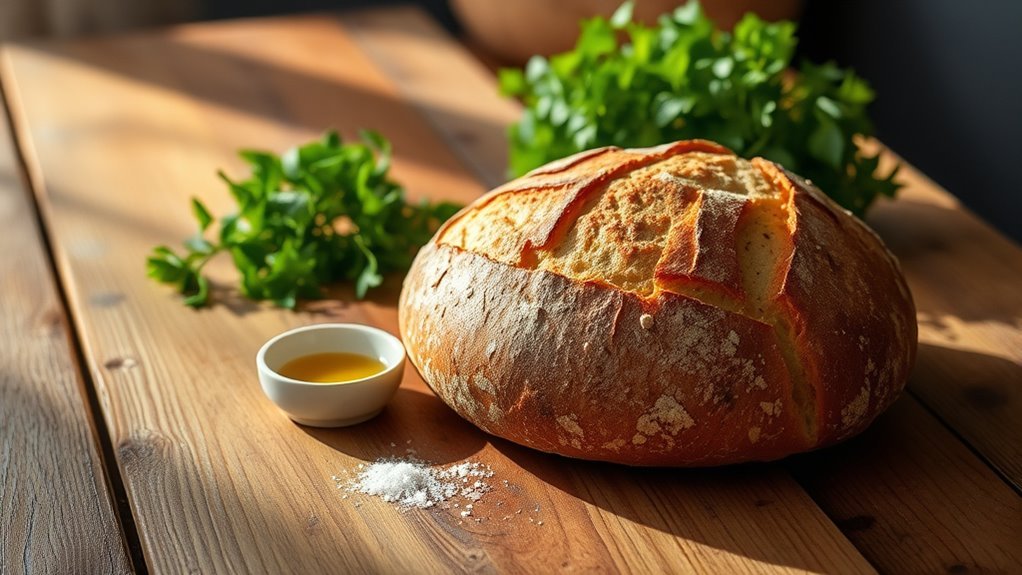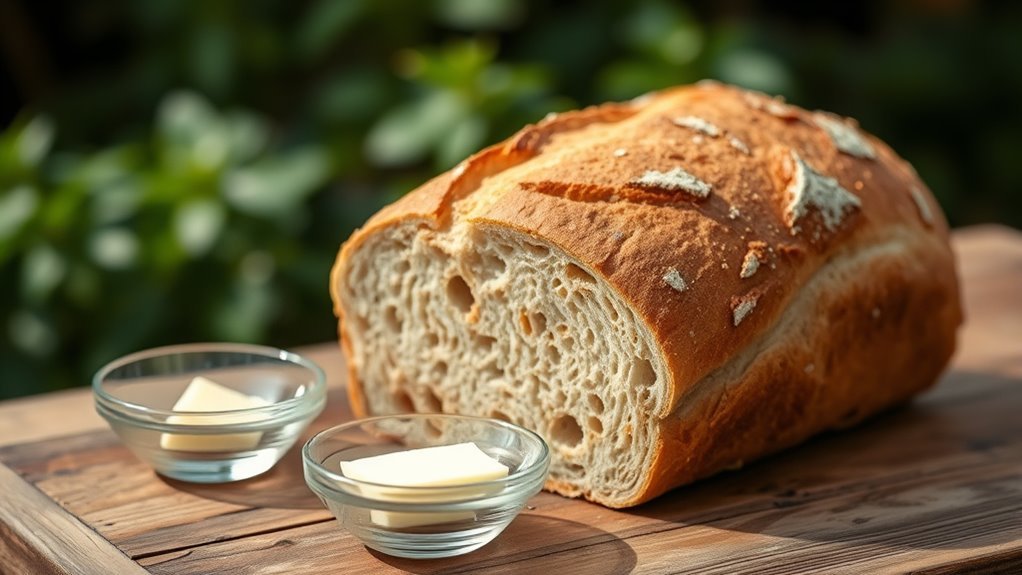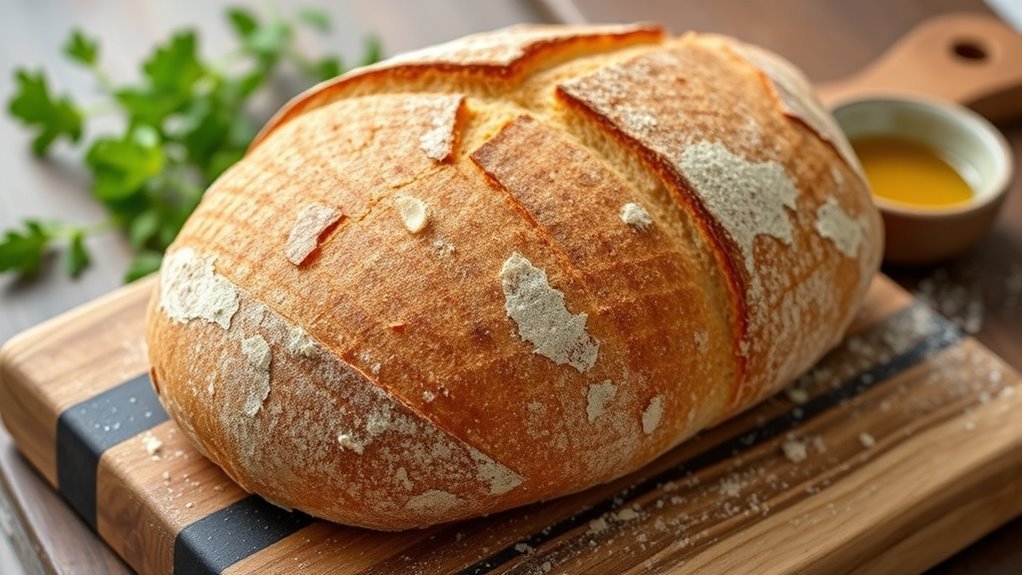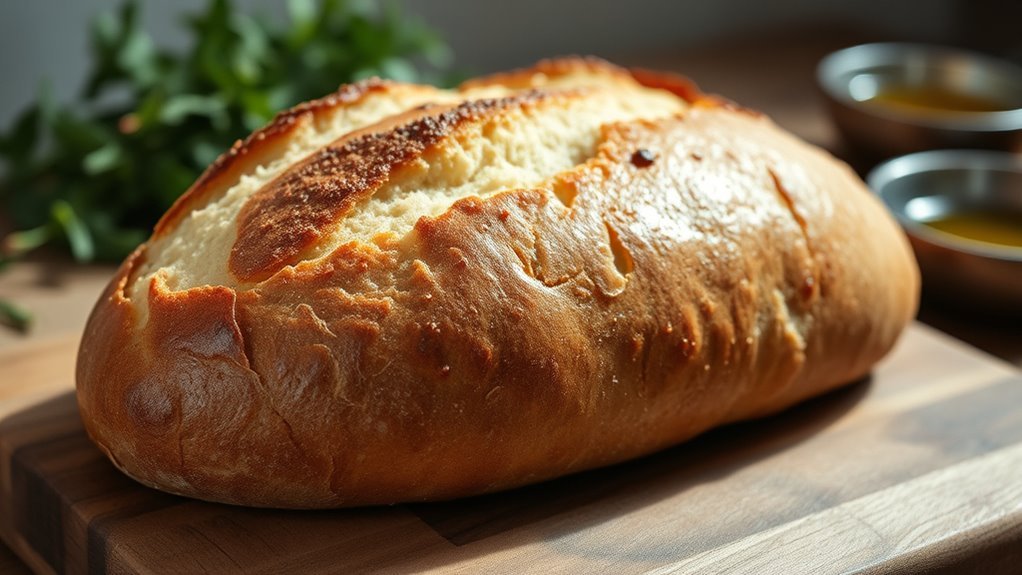Sourdough bread isn’t keto-friendly due to its high carbohydrate content, typically containing 15-20 grams of carbs per slice, which can disrupt ketosis. While the fermentation process makes sourdough easier to digest and lowers its glycemic index, it still doesn’t fit within the low-carb framework of a ketogenic diet. However, there are many delicious low-carb alternatives to enjoy bread-like textures without compromising your keto goals. You might find some enticing options ahead that fit your dietary needs.
Understanding the Keto Diet

When you immerse yourself in the keto diet, it’s essential to understand its foundational principles, since this low-carbohydrate, high-fat approach aims to shift your body into a state of ketosis. The keto principles revolve around achieving a superior macronutrient balance, typically consisting of around 70-75% fat intake, 20-25% protein, and only 5-10% carbohydrates. Meal timing plays a significant role in maximizing fat burning and ensuring stable energy levels. Your food choices should focus on healthy fats, low-carb vegetables, and quality proteins. While the health benefits are numerous, such as improved mental clarity and weight loss, common misconceptions about keto can hinder diet sustainability. Embracing these principles allows you to enjoy freedom in your food choices while reaping the rewards of this lifestyle. Additionally, understanding the science of ketosis is crucial for optimizing your results and maintaining long-term adherence.
Nutritional Profile of Sourdough Bread

While sourdough bread is often praised for its unique flavor and potential health benefits, its nutritional profile reveals important factors for those on a keto diet. Sourdough benefits include its easier digestibility and lower glycemic index compared to conventional bread, thanks to the fermentation process. This can lead to improved gut health and stable blood sugar levels for some individuals. However, there are also sourdough drawbacks to take into account; it generally contains higher carbohydrate levels than keto-friendly foods. This can hinder your ability to maintain ketosis. Additionally, the presence of gluten may be an issue for those with sensitivities. Furthermore, the nutritional value of sourdough can vary depending on the type of flour used, making it essential to assess the specific bread you’re considering. Weighing these factors is essential for anyone looking to enjoy sourdough while adhering to a keto lifestyle.
Carbohydrate Content in Sourdough

Understanding the carbohydrate content in sourdough is vital for those following a keto diet. While sourdough does contain carbohydrates, the amount can vary greatly based on the recipe and fermentation process. Typically, a slice of sourdough bread has around 15-20 grams of carbs. However, the fermentation process can lower the glycemic index, making sourdough a more favorable option compared to other carbohydrate sources. This means it may have a less pronounced effect on your blood sugar levels. If you’re monitoring your carb intake, it’s important to account for these values in your daily totals. Ultimately, moderation and awareness are key to enjoying sourdough while adhering to a keto lifestyle.
The Fermentation Process and Its Impact
Although many people enjoy sourdough for its unique flavor and texture, the fermentation process plays a crucial role in its nutritional profile, particularly for those on a keto diet. The fermentation benefits of sourdough come from the action of sourdough bacteria and yeast, which can enhance its digestibility and nutritional value. Here are some key impacts:
- Lower Glycemic Index: Fermentation may reduce blood sugar spikes.
- Increased Nutrient Availability: It enhances the bioavailability of vitamins and minerals.
- Probiotic Effects: Beneficial bacteria may support gut health.
- Decreased Phytate Levels: This leads to improved mineral absorption.
Understanding these aspects can help you appreciate how fermentation in sourdough contributes to a more balanced diet, even for those pursuing keto.
Comparing Sourdough to Other Breads
When you compare sourdough to other types of bread, it’s important to evaluate their carbohydrate content and how they fit into a keto diet. Sourdough varieties, often made from whole grains, can have lower glycemic indices than standard white bread, potentially making them a better option. However, bread comparisons reveal that even sourdough can be high in carbs, depending on the flour used. For instance, spelt sourdough may contain more carbs than a typical low-carb bread alternative. Knowing the specific nutritional breakdown of each type can empower you to make informed choices. Ultimately, understanding these differences helps you align your bread consumption with your dietary goals while enjoying the freedom to explore various options. Additionally, it’s essential to consider the carbohydrate content of different bread types to maintain a low-carb intake on a keto diet.
Can You Fit Sourdough Into a Keto Meal Plan?
Fitting sourdough into a keto meal plan can be a bit tricky, given its carbohydrate content. However, you can enjoy it mindfully by considering the following:
- Portion control: Limit your intake to small servings to manage carb consumption.
- Keto friendly toppings: Use options like avocado, cream cheese, or smoked salmon to enhance flavor without adding extra carbs.
- Sourdough substitutes: Explore alternatives like almond flour bread or cloud bread that align better with keto guidelines.
- Monitor daily macros: Verify your total carbohydrate intake stays within your target to maintain ketosis. Additionally, understanding your individual responses to carbohydrates can help you make more informed choices when including sourdough in your diet.
Alternatives to Traditional Sourdough
If you’re looking for alternatives to traditional sourdough that fit within a keto lifestyle, there are several options that can satisfy your cravings without derailing your dietary goals. Almond flour and coconut flour are popular bases for low-carb bread, providing the necessary texture while keeping carbs in check. Flaxseed meal can add fiber and healthy fats, making it a nutrient-rich choice. Cauliflower bread is another innovative substitute, blending veggies into a bread-like form. For cheese lovers, cheese bread delivers a savory option, while zucchini bread offers a moist, flavorful alternative. Ultimately, egg bread, made primarily from eggs, is protein-packed and versatile. These alternatives can help you enjoy bread-like experiences while adhering to your keto plan, as many of them contain higher dietary fiber content which supports digestion and prolongs fullness.
Tips for Enjoying Sourdough on Keto
Enjoying sourdough on a keto diet can be a bit of a balancing act, but it’s certainly possible with the right approach. Here are some tips to help you navigate this journey:
- Choose Sourdough Substitutes: Look for low-carb alternatives, like almond flour or coconut flour sourdough, which can fit better into your keto plan.
- Practice Portion Control: Be mindful of how much sourdough you consume; sticking to smaller servings can help you stay within your carb limits.
- Pair Wisely: Combine sourdough with high-fat toppings, such as avocado or butter, to enhance flavor and maintain ketosis.
- Monitor Your Body’s Response: Keep track of how your body reacts to sourdough; adjust your intake accordingly to stay on track with your keto goals.
Recipes for Keto-Friendly Sourdough
While traditional sourdough bread is typically high in carbohydrates, you can still indulge in delicious, keto-friendly versions by using alternative ingredients. Look for keto sourdough recipes that incorporate low carb ingredients like almond flour, coconut flour, or psyllium husk. These substitutes mimic the texture of traditional bread while keeping the carb count low.
For instance, a basic keto sourdough can be created by mixing almond flour, eggs, and a sourdough starter made from low carb flour. You might also consider adding seeds or spices for enhanced flavor. Additionally, using healthy fats in your recipe will support energy levels and promote satiety. Experimenting with these recipes not only satisfies your cravings but also aligns with your keto lifestyle, ensuring you enjoy the freedom of bread without compromising your dietary goals.
Final Thoughts on Sourdough and Keto Compatibility
Although traditional sourdough bread is generally not compatible with a ketogenic diet due to its high carbohydrate content, there are viable alternatives that can satisfy your cravings without derailing your nutritional goals. If you want to enjoy the sourdough benefits while maintaining a keto lifestyle, consider these options:
- Almond Flour Sourdough – Low in carbs and rich in healthy fats.
- Coconut Flour Sourdough – High in fiber and aids digestion.
- Psyllium Husk Bread – Mimics the texture of traditional bread without the carbs.
- Cauliflower Bread – A creative and low-carb alternative.
Incorporating these alternatives can help you achieve macronutrient goals while still enjoying the experience of bread on your keto journey.
Frequently Asked Questions
Can I Make Sourdough Bread Using Almond Flour?
Yes, you can make sourdough bread using almond flour. Almond flour benefits include being low in carbs and high in healthy fats, which can enhance your diet. However, keep in mind that the sourdough texture may differ from traditional wheat flour bread. You might need to experiment with hydration levels and other ingredients to achieve the desired consistency. Overall, it’s a great alternative for those seeking a gluten-free or lower-carb option!
Is Gluten-Free Sourdough Bread Keto-Friendly?
Yes, gluten-free sourdough bread can be keto-friendly, depending on the ingredients used. If you opt for gluten-free alternatives like almond flour or coconut flour, you can create a lower-carb version suitable for keto baking. Just keep an eye on the total carb count, as some gluten-free flours can be higher in carbs. With the right recipe, you can enjoy the tangy flavor of sourdough while staying within your macro goals.
How Can I Store Sourdough Bread on Keto?
To store sourdough bread on keto, think of it as tucking it in for a cozy night. For ideal sourdough storage, wrap your bread in a breathable cloth or paper bag to preserve its crust. If you want longer bread preservation, slice and freeze it, ensuring it’s well-wrapped to prevent freezer burn. Remember, keeping it away from moisture will help maintain that satisfying chew while adhering to your keto lifestyle. Enjoy!
Are There Any Keto-Friendly Toppings for Sourdough?
You can enjoy your sourdough with keto-friendly toppings like avocado spread or cream cheese. Avocado spread not only adds healthy fats but also provides fiber, keeping you full longer. Cream cheese, on the other hand, is low in carbs and high in fat, making it a perfect match. Both options enhance flavor without compromising your keto goals, so you can savor your sourdough while sticking to your dietary preferences. Enjoy!
Can Sourdough Trigger Cravings for Non-Keto Foods?
Yes, sourdough can trigger cravings for non-keto foods. Its unique fermentation process impacts blood sugar levels, potentially leading to increased hunger or cravings. When you enjoy sourdough, those familiar tastes and textures might remind you of other carb-rich foods, serving as non-keto triggers. It’s important to be mindful of your responses to sourdough, especially if you’re aiming for a keto lifestyle. Awareness can help you manage cravings effectively and maintain your dietary goals.
References
- https://www.healthline.com/nutrition/keto-diet-foods#breads-and-grains
- https://www.ncbi.nlm.nih.gov/pmc/articles/PMC6463704/
- https://www.webmd.com/diet/what-to-eat-on-keto-diet
- https://www.verywellfit.com/what-is-a-keto-diet-5110985
- https://www.washingtonpost.com/food/2021/07/20/keto-diet-foods/
- https://www.nutrition.org.uk/healthyliving/healthydiet/keto-diet.html
- https://www.sciencedirect.com/science/article/abs/pii/S2212267214000480


